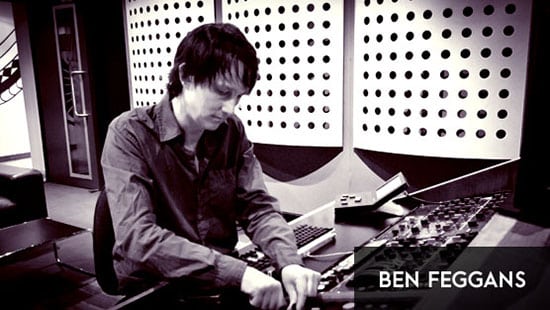In recent years, Ben Feggans’ passion for independent music has established him as one of the most sought after mastering engineers in the country. Carving out a niche for indie dance, electronic and hip hop, Ben has mastered numerous releases for artists such as Rüfüs (“Blue EP”), Ngaiire, Willow Beats, The Kite String Tangle and Dustin Tebbutt, Miami Horror,Tuka, and 360.
Ben worked closely with the Australian record label Future Classic since its humble beginnings in 2005, propelling Australian artists including Hayden James, New Navy, Flight Facilities, Flume and Mitzi to international acclaim.
We caught up with Ben to talk all things mastering.
You’ve managed to carve out a niche around the Indie/Dance, Electronic, Dub and Hip-hop sound. How did that come about?
BF: It just kind of evolved that way! I have a real passion for electronic and acoustic music, and initially worked with many electronic music artists as a mix engineer before mastering. I think you have to understand what the music is about when working on it, and the artists get that.
What’s your definition of mastering?
BF: Mastering is “the presentation of a mix”. It’s like framing a picture, you don’t want to upset the balance of the painting, just enhance what is already there.
What makes your approach unique?
BF: I’m quite technical so I use a combination of analogue and digital processing that is extremely well matched sonically and electronically. It’s mostly a simple chain but the right chain that works together as a whole. My approach is “less is more”.
How does your process differ from other mastering Engineers?
BF: My process is probably similar to other engineers. I give the entire track a good listen before making any changes, just to get a feel for what the artist is trying to achieve in their overall sound, then make a decision on the sound balance and processing. Different styles of music have a certain focus in terms of frequency balance, impact and dynamics. From experience, you tend to know which areas are the best to enhance for overall enjoyment to the listener. It’s also important that the style of music is mastered for the target medium it will be played on.
What excites you about the future of music?
BF: I have worked with labels such as Future Classic for over 10 years and enjoy the direction that indie/dance music has taken in Australia. Artists such as RUFUS and Ngaiire are pushing the boundaries with songs that are radio and dance floor friendly. I hope that there is more of a cross over sound in the future.
If you could have made one key piece of equipment you use, what would that be?
BF: The Duntech Sovereign speakers are essential. In terms of gear I’d like a Knif Soma EQ to match by Knif Vari-mu compressor. Mastering equipment is so expensive in Australia – maybe Studios 301 can buy me one?
Do you have an tips or advice for people mixing or getting songs together for mastering?
BF: Listen to your online mix on a variety of playback systems. Level match and compare with commercial tracks, and ensure there are no frequencies (especially sub frequencies) that are out of control but you just can’t hear it due to your room or speakers. A spectrum analyser and RMS metering definitely can assist this. Leave a few dB of headroom when bouncing audio for mastering. Most importantly, be satisfied with your mixes and remember it takes years to sound like a pro!
What’s the most important aspect in the mastering process?
BF: The room, monitoring and experience. You can’t master a record without the knowledge that your room and monitoring are accurately telling you what is going on.
Check out Ben’s blog posts here:
https://studios301.com/blog/ben-feggans-on-loudness-part-1/
https://studios301.com/blog/ben-feggans-on-loudness-part-2/
https://studios301.com/blog/dangerous-bax-vs-uad/
And his posts on Gearslutz https://www.gearslutz.com/board/members/15707-ben-f/
For mastering enquiries or to book Ben Feggans please contact
Mastering Manager
Lynley White-Smith (02) 9698 5888
lynley@studios301.com

Leave a Reply